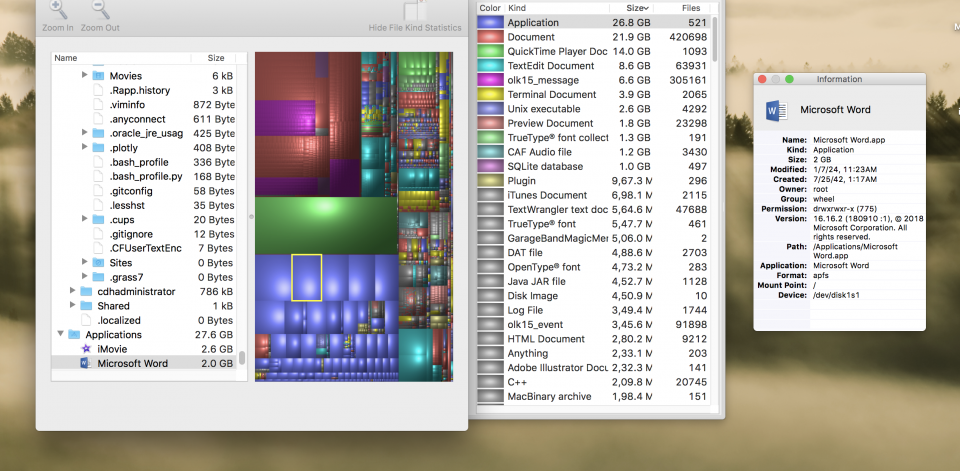
By DSG Group on November 6, 2018
It’s happened to all of us. Maybe we’re downloading a vacation’s worth of photos onto our computer, or maybe our new laptop comes with half the hard drive space of our old one. Whatever the cause, we’ve seen that message, “Insufficient storage,” that stops us in our tracks. The question is, how do we solve the problem?
You have two options, according to Humtech’s Department Technical Analysts, or DTAs. First, you can try to “prune” your hard drive, deleting unnecessary files to free up space. Adrian Lozano, DTA for the English department, recommends looking in both your Downloads folder and your Recycle Bin (that’s the Trash folder, Mac users). “People forget that they have to manually empty these folders. I’ll often find gigabytes worth of useless files in these locations.”
If your bloat isn’t that easy to find, you can use tree graph software like KDirStat for Windows or Disk Inventory X for Mac to get a bird’s eye view of your hard drive. (Faculty, feel free to ask your DTA for help installing and operating these programs.) These tools will show you what your largest files and folders are, helping you create a strategy for pruning or archiving some of your bloat. Just be warned: since programs like these have to read through every single file on your hard drive to make that graph, it can sometimes take them a few hours to scan and visualize your computer, especially if you have a large drive.
You can also look into upgrading your operating system, especially if you have an older computer. “If you have Windows 7 on your machine, and you’ve been installing every service pack as required, I’ve seen that take up over 170GB,” says Omar Casillas, DTA for the departments of Spanish & Portuguese and Linguistics. “A clean install of Windows 10, on the other hand, requires just 60GB.” Don’t hesitate to ask your DTA if this might help alleviate your file storage issues.
If pruning won’t solve your problem, your other option is to move some or all of your files to external storage, either a local backup drive or a cloud storage solution, like Google Drive or Box. “Cloud storage is a lot safer than most people think,” Adrian argues. “Unlike a local hard drive, you can access it from just about anywhere. Even if your computer crashes or is stolen, you still have access to your critical files.” Cloud storage is very inexpensive, too; and if your data are work-related, UCLA licenses Box for HIPAA- and FERPA-compliant file storage, so there’s no cost to you to use it. Again, your DTA is happy to advise you on which solution is right for you.
Even though it never seems to occur at a convenient time, running out of hard drive space shouldn’t worry you. Humtech can help you find a solution that meets your needs and gets you back to work as soon as possible.
